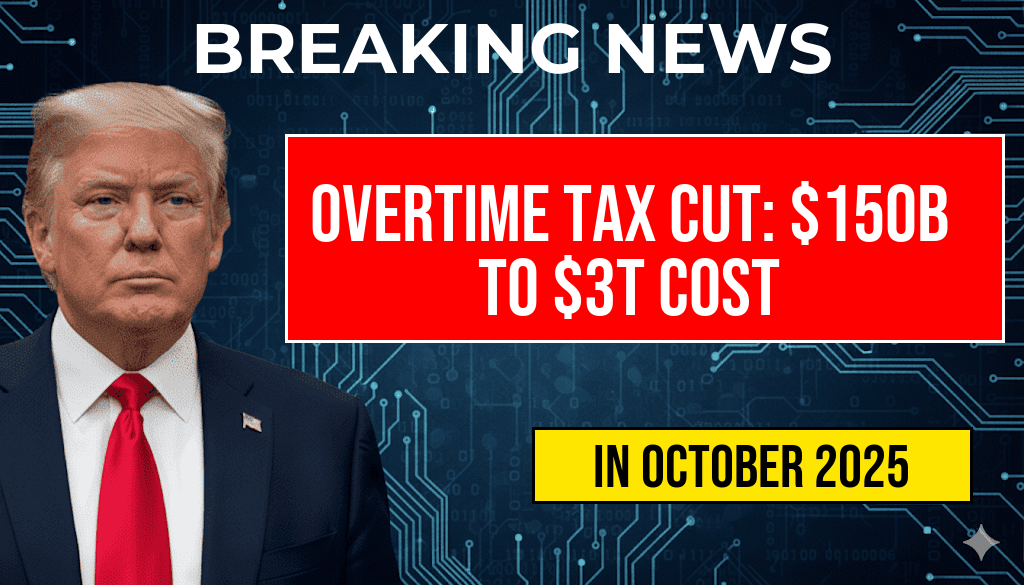The potential implementation of an overtime tax cut has sparked significant debate among economists and policymakers, with estimates suggesting that the financial repercussions could range from $150 billion to a staggering $3 trillion. This variability hinges on the specific parameters of the tax policy, including its structure and the number of workers affected. As discussions escalate, understanding how these changes might impact individual take-home pay becomes crucial for American workers. The overtime tax cut aims to alter the taxation framework for overtime earnings, which are typically taxed at a higher rate, leading to varying consequences for different income brackets. This article delves into the potential financial impact of the proposed changes and offers insights into how it could affect your paycheck.
What Is the Overtime Tax Cut?
The overtime tax cut proposal seeks to revise the taxation of overtime wages. Currently, employers must pay employees who work over 40 hours a week at a rate of 1.5 times their regular pay. Under the new framework, the tax burden on those additional earnings could be reduced, theoretically increasing net take-home pay for many workers. However, the proposal has met with skepticism regarding its broader economic implications.
Financial Implications of the Overtime Tax Cut
Estimates regarding the financial implications of the overtime tax cut vary widely, primarily due to differing assumptions about the number of employees affected and their respective income levels. Here are some key points to consider:
- Economic Forecasts: According to some analysts, the cut could cost the federal government between $150 billion and $3 trillion over a decade, depending on the implementation specifics.
- Impact on Higher Earners: High-income earners may see less impact from the tax cut, as a greater proportion of their income may not come from overtime pay.
- Lower-Income Workers: Conversely, lower-income workers, who often rely more heavily on overtime, could see a substantial increase in their take-home pay.
How Will It Affect Your Take-Home Pay?
The effect of the overtime tax cut on individual take-home pay will largely depend on several factors, including your current salary, the number of overtime hours worked, and your tax bracket. Here’s a closer look:
| Income Bracket | Current Tax Rate | Estimated Tax Reduction | New Take-Home Pay |
|---|---|---|---|
| Low Income (Under $30,000) | 10% | 15% | $33,000 |
| Middle Income ($30,000-$70,000) | 22% | 10% | $61,000 |
| High Income (Above $70,000) | 24% | 5% | $124,000 |
Potential Economic Consequences
While the overtime tax cut aims to enhance disposable income for many workers, its broader economic effects could be mixed. Critics argue that such a policy shift could lead to:
- Increased Deficit: The significant revenue loss could exacerbate the federal deficit, potentially leading to cuts in essential services.
- Inflationary Pressures: With more disposable income, consumer spending might increase, contributing to inflation.
- Employer Reactions: Companies might respond by adjusting salaries or reducing overtime hours, which could negate the benefits of the tax cut.
Conclusion: Weighing the Pros and Cons
As the debate surrounding the overtime tax cut continues, it’s essential for workers to understand the potential impacts on their finances. The range of estimated costs highlights the uncertainty surrounding the implementation and effectiveness of such a tax policy. Individuals should monitor developments closely, as changes could significantly affect their take-home pay and overall economic stability.
For further reading on this topic, check out these resources: Forbes on Overtime Pay and Wikipedia on Taxation in the U.S..
Frequently Asked Questions
What is the proposed overtime tax cut?
The proposed overtime tax cut aims to reduce the taxes applied to overtime pay, potentially increasing the take-home pay of employees who work beyond their regular hours.
How much could the overtime tax cut cost the government?
The financial impact of the overtime tax cut is estimated to range between $150 billion and $3 trillion, depending on its implementation and the overall response from the workforce.
Will the overtime tax cut directly affect my take-home pay?
Yes, the overtime tax cut is designed to directly impact your take-home pay by reducing the taxes you pay on overtime wages, allowing you to keep more of your earnings.
What are the potential financial implications of this policy?
The financial implications of the overtime tax cut could include changes in government revenue, adjustments in labor costs for employers, and varying effects on employee motivation and work-life balance.
Who will benefit the most from the overtime tax cut?
Employees who frequently work overtime hours are likely to benefit the most from the overtime tax cut, as it will provide them with increased take-home pay and incentivize additional work hours.











